Hist 487_16 The Beginning of Mongol rule in China
The largest empire the world has ever seen was created by the Mongols.
During their rule communication and trade throughout the Eurasian continent
was greatly enhanced. "Eurasian history begins with the Mongols" and
indirectly led to the European Age of Exploration"(Rossabi, p. 1-2). Yet
the diversity of peoples and cultures as well as the size of the empire made
it difficult to stay in power and control over a long period.
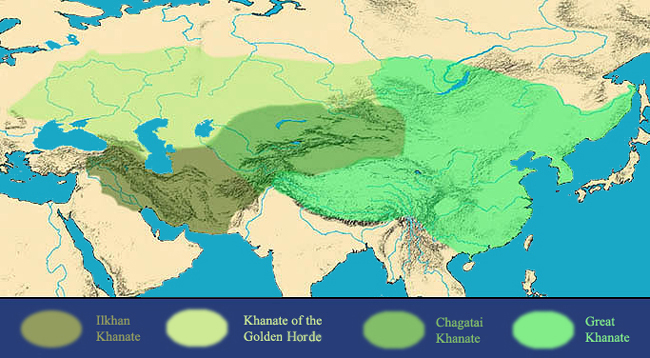
Extension of the Mongol empire:
The succession of rulers in the four Mongol territories after Chinggis Khan's
death was the result of a power struggle between Sorghaghtani Beki (Tolui Khan's
wife and Khubilai Khan's mother; Nestorian Christian) who supported Batu Khan
and Güyüg Khan (son of Ögödei and Töregene) who died
during his attack against Batu.
First generation of Mongol rulers after the conquest led by Chenggis:
Khaghan: Ögödei (d. 1241; Chinggis Khan's third son); he
defeated the Jin Dynasty and occupied north China
Batu Khan (Chinggis Khan's grandson) ruled over the Golden Horde
Chaghadai (second son of Chinggis Khan) ruled over Central Asia
Tolui (Chinggis Khan's youngest son; father of Khubilai Khan) ruled over north
China and Mongolia
The next generation of rulers owed much to the initiative of their
mother, Sorghaghtani Beki, Tolui's wife, for their political positions:
1. Möngke became Khaghan
2. Khubilai became Khaghan and ruler over China
3. Hülegü became ruler over Persia (after having destroyed Baghdad)
4. Arigh Böke ruled over the Mongol homeland
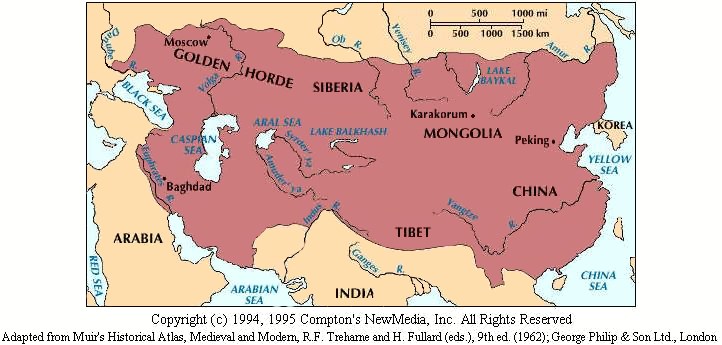 Location
of the Mongol capital Khara Khorum and the capital of the Great Khanate, Dadu
Location
of the Mongol capital Khara Khorum and the capital of the Great Khanate, Dadu
Karakorum received a city wall and permanent buildings under the rule
of Ögödei (r. 1229-1241)
-1206 Temüjin (1167-1227) becomes Chinggis Khan, supreme ruler:
- - unified the Monol tribes
- installed a law code of written regulations (script based on the Uighur
script)
- arranged the army in units of tens, hundreds, and thousands (transcending
tribal divisions)
- core: 10,000 elite corps riders (total number in battle: up to 130,000 men)
- army was precisely coordinated and operated with utmost discipline
- resistance was met with brutal terror, surrender saved lives
- courier service linked the centers of rule; riders could cover a distance
of up to 200 miles per day
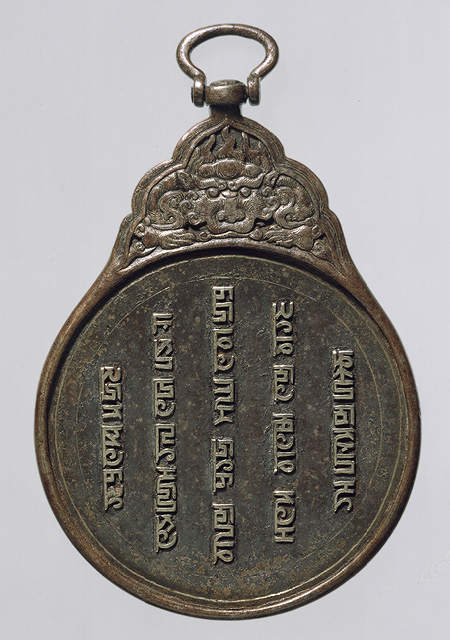
Mongol travel document with text in 'Phags-pa script
- no organized political system with regulations for succession procedures;
political systems of Persia and China used as 'host systems'
- succession was decided during a khuriltai, a Great Convention
- traditional economy: water, gras and the five principal animals: sheep,
goats, yak (for food, clothing, shelter, fuel), camels (for transportation),
and horses (for mobility in war)
The early Mongol empire in China (1211-1260)
- first attack of China: 1211
- Yelü Chucai (1189-1243); astrologer and advisor of first Chinggis
and then Ögödei
- of royal Liao origin; mediator between the Mongol rulers and the Chinese
populatio
- created a tax system administered by ten official tax bureaus staffed
with civil officials in 1229
- saved northern China from being transformed into pasture
- conducted a census;
- advised Ögödei to build a capital which was constructed in Mongolia
and named Khara Khorum
- could NOT change the division of China into loosely controlled military
commands (which were later transformed into provinces)
- tried to revive the civil service examinations
- against his advice tax collection was laid in the hand of non-Chinese
bidders who exploited the population
The Rule of Khubilai Khan (1215-1294; r. 1260-1294)
- 1252: before Khubilai became the
ruler of China he was sent to pacify the southwest (Vietnam and Yunnan)
- intended to establish military farms: soldiers would be self-sufficient
and serve as surveillance force
- installed a 'Pacification Bureau' with military and police functions,
the license to print paper money to promote trade;
- the regent of the kingdom of Dali (predominantly inhabited by the Bai
minority) excuted three Mongol envoys who were sent in succession in order
to move the ruler to surrender
- finally Dali surrendered and Khubilai executed only the officials who
had ordered his envoys to be killed; the ruling Tuan family continued to
co-rule with an appointed Pacification Commissioner
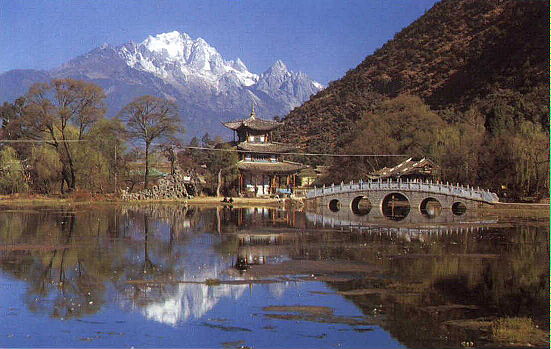

The famous Three Pagodas of Dali
- the submission of Vietnam proved to be more cumbersome: Vietnamese resistance
movement drove out the Mongols twice
- Khubilai had Confucian scholars registered in order to prevent Mongol
nobles from abusing them as slaves.
- He employed Chinese scholars as advisers in order to gain the trust of
his Chinese subjects; he followed most of their proposals:
- reducing the tax burden
- restoring ancient rituals and ceremonies
- establishment of a capital within his apanage which was modeled
after Chinese capitals of the past: Kaiping or 'Upper Capital" =
Shangdu [= Xanadu], ca. 125 miles northwest of Beijing surpassed the Mongol
capital Khara Khorum in size and grandeur
- -1258 : a conflict between Buddhist and Daoists (81 sect) followers
became threatening: temples and moasteries were destroyed Buddhist sculptures
and defaced paintings, over the dispute which of the two religions was the
true and reliable one. The Daoists claimed that Buddha was one re-incarnation
(of 81) of Laozi who had died in India after having taught there. Buddhist
sutras were derived from Daoist texts.
- Möngke Khan entrusted his brother Khubilai with solving the dispute.
Daoist, Buddhinst and Confucian teachers convened in Kaiping and argued in
the presence of the khan which of the teachings was the superior one. The
convention ended with the conclusion that the Tibetan Buddhists were the convincing
group. They referred to the lacking of a reference to the story of Buddha
as a re-incarnation of Laozi in Sima Qian's 'Record of the Historian'; by
using the locus classicus for justification they undermined the Daoists credibility.
In addition, the Daoist representatives failed to perform any magic which
further discredited them.
-1258: Möngke also used his brothers shrewdness in the conquest
of southern China. In 1258 Khubilai conquered Sichuan but due to Möngke's
death one year later, the military expansion to the south came to a halt,
after the Mongol army was able to create a stronghold on the southern bank
of the Yangzi River.
-
- 1260: A khuriltai quickly set up in Kaiping elects Khubilai
as the Great Khan, a position challenged by Arigh Böke who dies shortly
after.
Khubilai's rule over China as Great Khan
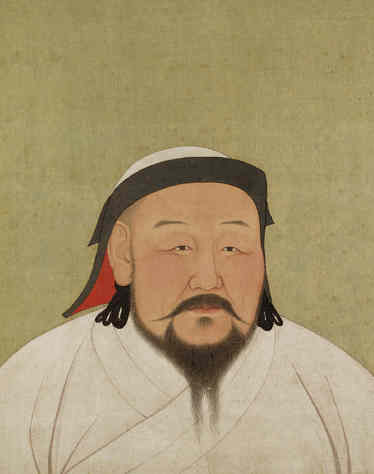
Portrait of Khubilai Khan
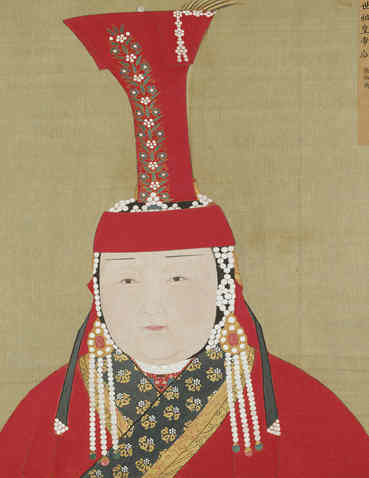
Portrait of Chabi, Khubilai's second wife
When setting up the new administration
for China, Khubilai again followed many ideas of his Chinese advisers:
- the tax burden for the peasants should be minimal
- paper money should be used as currency
- the state monopolies should be kept
- a successor should be named
The only advice Khubilai did not follow was the restauration of the civil
service administration because he did not want to become too dependant on
Chinese officials.
- - 1264: Khubilai becomes the generally acknowleged Great Khan and
transfers the capital to Beijing, a move that allowed him to demonstrate his
appreciation for the Chinese lifestyle and tradition and win the support by
Confucian scholars
- Layout symbolizes traditional Chinese citybuilding [Ancestor
altar; 'Altars for the Deities of Soil and Grain'; Confucius shrine]
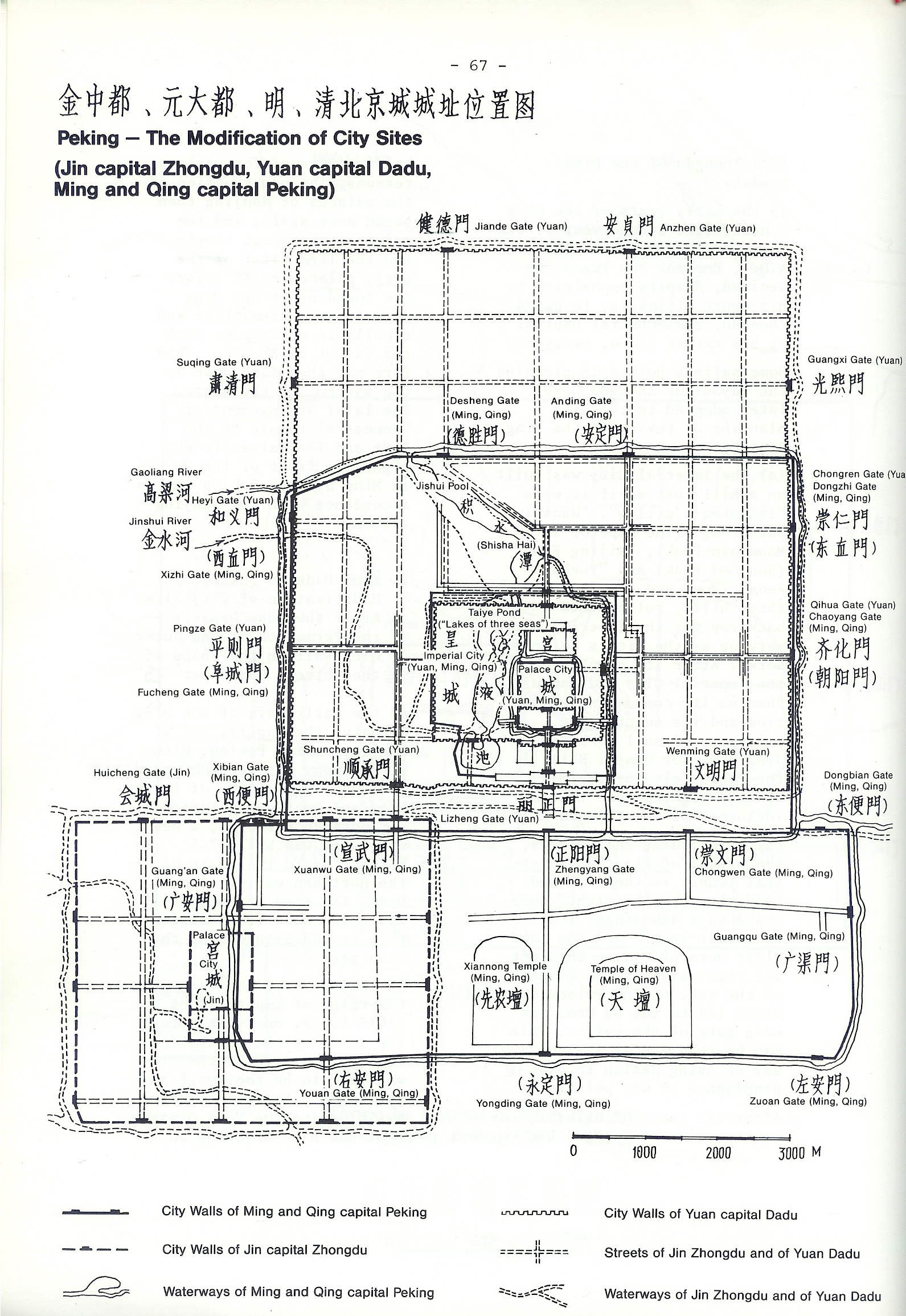
- 1271: adoption of the dynastic name YUAN ['Origins of the Universe'] &
Chinese court ceremonial
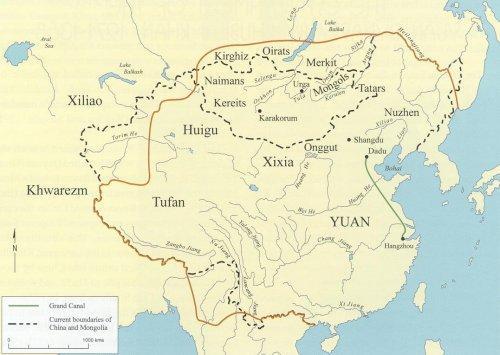
The Yuan empire
- Khubilai met the difficulty to balance between the sedentary Chinese population
and preserving the cultural values and lifestyle of the Mongols: no intermarriage;
no learning of the Mongo; language by Chinese subjects; but patronage of the
arts, of science and medicine
- 1274: first attack of Japan: 15,000 Mongol, Chinese, Jurchen soldiers, 6,000-8,000
Korean troops; 300 large ships, 400-500 small vessels
- 1281: second attack of Japan: both without success
- 1279: fall of the Southern Song, defeat of the Chinese navy; distrust against
southern Chinese, because many were loyalists of the Song)
- 1280 attacks against Burma and Vietnam
Social stratification / the administration under Khubilai's
Rule:
- Social stratification
1. Mongols
2. Mongol allies with special status (Jin, Turks, Persians, Syrians) [privileged
in financial transactions; worked as scribes interpreters, tutors, merchants,
soldiers]
3. Northern Chinese (including Liao, Jin, Korean families)
4. Southern Chinese (80% of the population: ca. 50 mio.)
Administration:
Khan
Two Prime Ministers and Central Secretariat
Six Ministeries (Personnel; Revenue [census, tax collection, tribute];
Rites [ceremonies, music, foreign envoys, sacrifices]; War [military;
postal stations]; Justice; Public Works
- local administration: provinces headed by prime ministers and
Pacification Commissioners; 180 circuits
Religion under the Yuan
- Tolerance towards Daoism, Tibetan Buddhism (Lamaism: synthesis
of Buddhism and Tibetan Bon religion; magic practices); Nestorian Christians,
Muslims [exempt from regular taxation], Catholics, Jews; tax exemption for
all religions
- Tibetan abbot ruled Tibet after its submission on behalf of the Mongol
ruler
- Khubilai became identified as Boddhisattva Manjusri, the boddhisattva
of Wisdom; he was portrayed as the Cakravartin = Universal emperor
The Economy under the Yuan
- The South remained the main economic region: Cotton; silk; porcelain
-Encouragement of agriculture [Office for the Stimulation of Agriculture
established]; relief measures [tax remissions; granaries for the storage
of surplus grain]
- organization of rural households: units of 50 households under the direction
of a village leader
- establishing of charity granaries
- regular system of taxation
- support for merchants and merchant organizations
- paper money became the sole legal currency which was backed by either
silk or silver
- improved transportation and postal system: ca. 1,400 postal stations with
about 50,000 horses, 8,400 oxen, 6,700 mules, 4,000 carts, about 6,000 boats
- emphasis on medicine (physicians exempted from corvee labor and other
fiscal duties)
- state monopoly on bamboo for military purposes
- monetary compensations for punishment [new law code installed; based on
Song law]
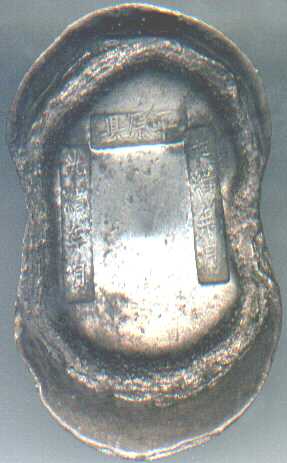 Yuan silver
ingot
Yuan silver
ingot
Cultural Patronage
- The patronage of cultural projects could be used for a
twofold purpose:
a. Khubilai could portrait himself as propagating Chinese culture and the
Chinese arts
b. As the ruler over the entire Mongol domain he sponsored cultural projects
that were of specificMongol interest
-
For the growing bureaucracy and the administration
of the Mongol empire it was essential to develop a Mongol script instead
of 'loaning' the Chinese or Uighur scripts for documentation; the Tibetan
lama and adviser of Khubilai developed a new, vertically written script
out of the Tibetan alphabet that was used for the Mongol language. It was
more precise than the Uighur script and was adopted as the 'State Script'.
Nevertheless in practice it never completely replaced the use of Chinese
and Uighur.
-
The Yuan dynasty became the essential period
for Chinese theater. 160 palys are extant from the time, more than 500 were
written and performed, but have not been preserved. Composing drama became
an intellectual endeavor for many literati who were deprived of a carreer
in the civil service. They often wrote in a colloquial style, not without
using the medium to bring forward political criticism. Plays circulated
just as novels since cheap serial produced prints became available.
-
Khubilai succeeded in employing several Chinese
connoisseurs of painting to create a catalogue of the Imperial Painting
Collection of the Song which he had brought to the capital Dadu (Beijing).
Intellectuals in general and among them especially painters were divided
in their approach to Yuan rule. While many retired to a life in seclusion,
some followed the call of the Khan and worked for him at court. The most
prominent among them Zhao Mengfu (1254-1322), a descendant of the royal
clan of the Song, and therefore of special support for Khubilai. He eventually
was appointed as the President of the Hanlin Academy, the most important
cultural institution associated with the government.
- Crafts were supported by the Khan since they were
promising economic assets. They were administered by an independent Bureau
(the Directorate-General for the Management of Artisan-Serfs and All Classes
of Civil Artisans). The Bureau had 30 branch offices and dealt with ceramics
(all kilns were registered and taxed), textiles (also produced for foreign
trade), lacquerware, sculpture, and architectural construction.

Golden cup with 'thumb plate'
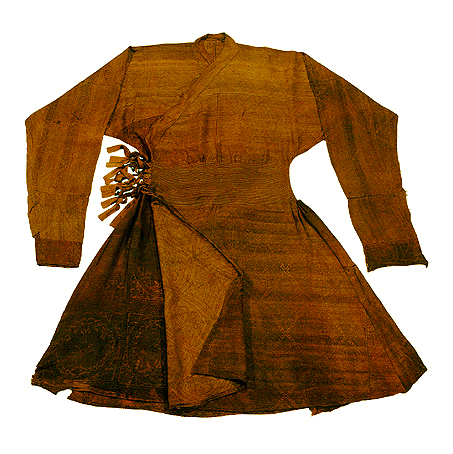
Mongol silk robe
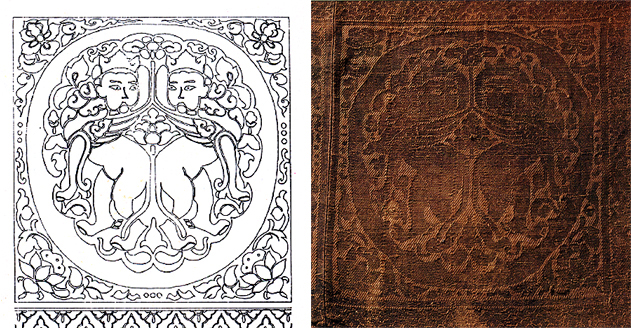
Central Asian decor of a Mongol silk robe
- Mongol ceremonies and rituals were preserved: Ritual of scattering
the mare's milk (New Years Blessing); ritual of shooting arrows at the Mongol
enemies (symbolized as straw puppets); koumiss libation before battle, etc.
Women's rights were preserved (no footbinding); Mongol clothing prevailed
among men and women; hunting remained a favorite and celebrated pasttime (and
training for battle at the same time; hunting on the farmland of the Southern
Chinese was forbidden)
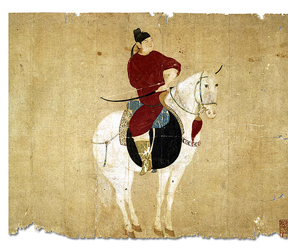
Portrait of a Mongol noble

 Location
of the Mongol capital Khara Khorum and the capital of the Great Khanate, Dadu
Location
of the Mongol capital Khara Khorum and the capital of the Great Khanate, Dadu





 Yuan silver
ingot
Yuan silver
ingot 


